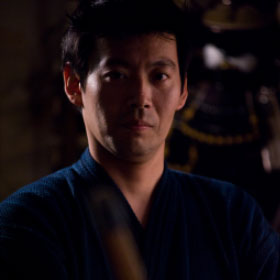Need Kendo Instructions?
You Got It!
You Got It!
Tsuki training
by Olga
(Ukraine)
When we train tsuki with or without a partner - should we bounce back immediately after we've executed a thrust? Or we have to stay for a moment where we have appeared after a thrust and go back when we are about making one more tsuki.
When we make tsuki, can we leave our left foot behind where it was at the beginning of the thrust? (I saw it in some videos of shiais.) Or we should use footwork as if we're striking men and immediately move left foot to the right to be in a correct position.
Answer: Basically you should pull back your shinai after tsuki. We usually move our feet forwards if executing a both handed tsuki. If executing one handed tsuki, we usually do not mover forwards.
Now sometimes we do not pull our shinai out because
- we missed the target or
- tsuki is a part of ni dan waza (two continuous strikes such as tsuki and men) .
If we miss tsuki, we do not really pull out our shinai because if we pull out shinai we may get struck. Also it is very hard to pull the shinai out if we miss the target.
However, we should not push our shinai in if we miss because it is too dangerous. If you miss the target, simply stop and try to pull out your shinai.
Especially if you are not very experienced, stop and pull out your shinai.
If a tsuki is a part of your attacking process, you do not want to pull your shinai back like you usually do to make it a valid thrust. In this case, your body should keep moving forwards so you can execute the next strike.
Morote Tsuki (two handed tsuki) practice
It has two goals.
- To execute an accurate tsuki
- To learn the body movement, i.e. pushing the lower body forwards.
After successfully hitting the target, pull back your shinai back to chūdan.
Take a step forwards onto the right foot followed by the left foot. You DO NOT pass your opponent.
Katate Tsuki (one handed tsuki) practice
Since this is executed by one hand, the person who executed katate tsuki has disadvantage. That is why we do not want to get close to our opponent.
We do use fumikomi (this fumikomi should not be as powerful as the one we use in men strikes) so we can reach the target. But the left foot does follow the right foot usually. But depending on the distance, the left foot moves forwards as well.
Must take chūdan after thrusting the target.
You DO NOT pass your opponent.
Hope this helps.

